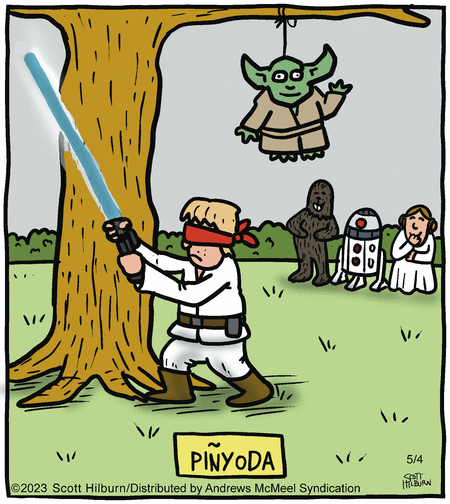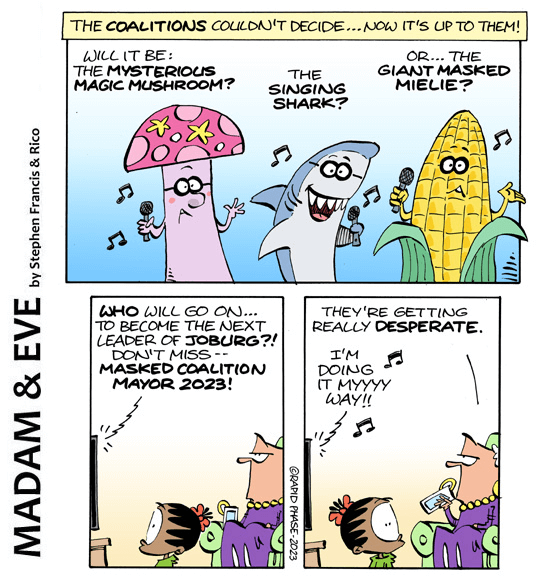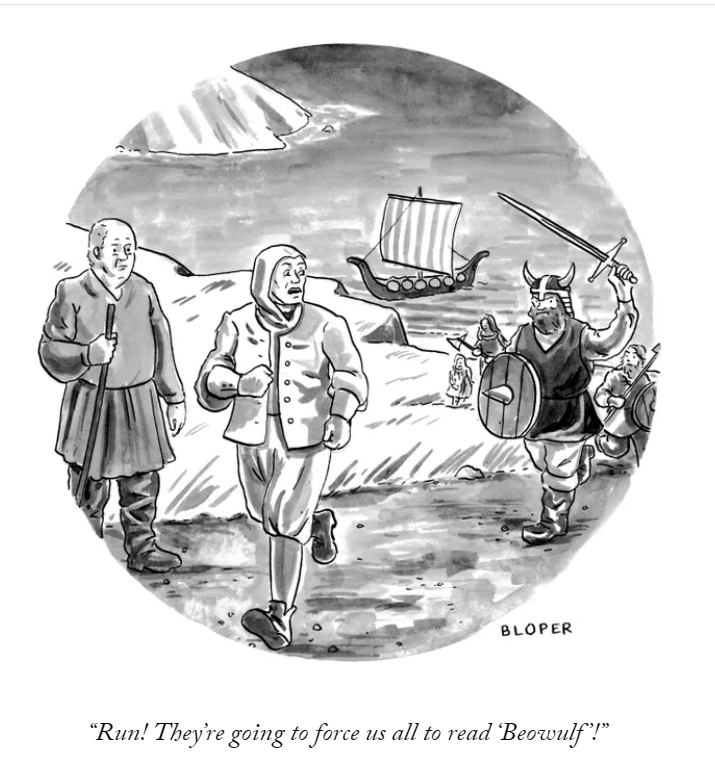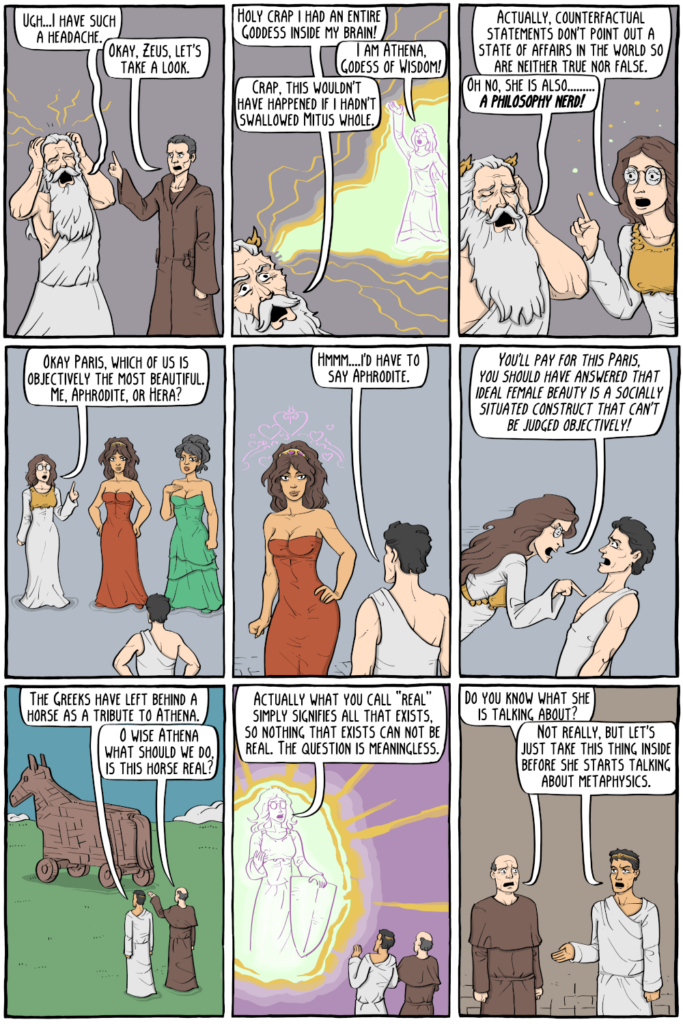We’ll start with the Argyle Sweater (AMS), because when I saw it, I wondered why Scott Hilburn didn’t save this semi-Hispanic gag for tomorrow, but then, as I translated tomorrow’s date in my mind, I realized today’s date.
And, yes, I subsequently came across a veritable plethora of Star Wars jokes, not all of them knee-slappers, which makes me wonder if May the Fourth has become more obligatory than inspiring.
Which would be fitting, since making new Star Wars films seems to have done the same.
Still on the topic of wretched excess, I don’t even know who is running for mayor of Johannesburg, South African politics having tumbled into an impenetrable pothole several years ago, but today’s Madam & Eve sent me scurrying to the Googles to see if American cultural hegemony included sending them “The Masked Singer” or if they had their own version.
I’m not sure if I am more appalled and embarrassed that they would watch the show at all or that our pop stars are so well known on the other side of the globe that people could guess who they were under those costumes. But apparently the show began in South Korea, so I’m not taking the blame for it.
And, assuming they’re watching our version, they’re apparently watching it in such numbers that SABC is producing a South African version that will debut this summer. Or, I should say, this winter, but in June.
I can’t get South African television here, but that won’t stop me from watching every bit as often as I watch the version of the Masked Singer that is available here.
The whole thing doesn’t put me in the mood for Brendan Loper’s cartoon, because, while it’s some consolation that the Masked Singer isn’t purely American culture that has gone global, some culture is good, and I enjoyed Beowulf, with reservations.
I was glad, to start with, that we only sampled the original English version rather than having to translate the whole thing, this being high school and not college. Also, I was sorry it was either somewhat fragmentary or perhaps that storytelling hadn’t quite emerged as a coherent art form.
Either way, my recollection is that it had some narrative gaps, but, then again, my whole life in high school was full of narrative gaps.
We also read “The Canterbury Tales” but boy-howdy not all of them, and it makes me wonder how they’d fare in the curriculum of high schools in Florida and Texas, given that they’re about a group of Christians on a pilgrimage, which is good, but the Wife of Bath is woke plus some and it doesn’t stop there.
My guess is that you could teach it, because the book-burners never read the texts they condemn. If William Burroughs had written a book called “I Love God,” it would probably be required.
I read both the Iliad and the Odyssey to my boys when they were little, though not starring the version of Athena seen in the current Existential Comics. The Odyssey went really well, but the Iliad had too many catalogues of who had bitten the dust and what they’d been wearing, which tended to slow down the action.
But not as much as this, which is, at once, both an illustration of why I switched from majoring in English to classics and why I sometimes regretted the move. If majoring in English is like dissecting a bird to see why it flies, majoring in classics can be like dissecting life.
Yes, get the wooden horse inside. Loosing a pack of Achaean warriors inside your city is better than listening to someone drone on about metaphysics.
On a marginally more serious note, you really should enjoy what you do and, metaphysics aside, I liked reading and discussing classics far more than analyzing poetry, Ulysses being an enjoyable challenge in all three zones.
But this Non Sequitur (AMS) brings back memories of my next phase, when I was out of school and striving to be JD Salinger. I was never nagged about speed — that’s the joke here — but people did say, “You know what you ought to write?” which translates to giving up caring about your work and just cranking out the kind of stuff that sells.
Which some writers do. I used to say I’d rather write ad copy than crank out spy novels and suchlike, but then I spent a couple of years writing ad copy and, boy, will that kill your soul.
Mind you, there are happy moments in commercial work: While Van Gogh was creating brilliant paintings that nobody wanted to buy, Toulouse-Lautrec was painting posters.
Wikipedia explains that, although Toulouse-Lautrec was doing commercial work, it was what he enjoyed. “In addition to his alcoholism, he developed an affinity for brothels and prostitutes that directed the subject matter for many of his works recording many details of the late-19th-century bohemian lifestyle in Paris.”
Not that Van Gogh was a teetotaller, but when he got drunk, Gaugin cut his ear off with a sword. I think I’d rather hang around drinking and cavorting with the brothel staff, myself.
But I digress.
What I did discover in my Salinger years was that I’d rather flip burgers than write crap. No kidding: I enjoyed working the grill, especially during a rush. Then I could go home and write whatever I wanted, instead of extolling the virtues of some decrepit condominium firetrap.
Or I could go home and play my guitar. Congratulations to Graeme MacKay for this tasteful, insightful sendoff to a great musician whose work I often played.
My elementary school music teacher schooled us in folk classics, but I really developed my interest watching Oscar Brand’s Let’s Sing Out on Canadian TV. I don’t remember if I ever saw Lightfoot there, but I certainly remember Ian and Silvia, and several other Canadians and Americans who covered Lightfoot’s music, which then became the backbone of my college coffeehouse friends’ repertoires.
Though I bought and played his albums, I heard more of his early stuff covered by other people than I heard it played by him. Lightfoot was everywhere, and if you lived just under the border, as I did for a quarter of a century, he was even more everywhere than that.
I still think of a Canadian girl I might have married back then, wondering if she mentioned my name, just in passing, but realizing that that was what she got for loving me.
Gordon understood.








Good morning, Mike.
“If majoring in English is like dissecting a butterfly to see why it flies, majoring in classics can be like dissecting life.”
I think I just found my e-mail signature quote for June. Thank you.
One of my friends wrote ad copy, then turned to writing science fiction. Same thing. I’ve cleaned monkey cages, then went on to writing ad copy. Same thing.
I was a bookkeeper, then turned to writing ad copy. And that, my friends, is how to make writing ad copy satisfying, at least for a while.
Where can I get a job cleaning monkey cages?
https://www.salary.com/job/emory-university/animal-care-technician-i-yerkes-lawrenceville
I worked there in 1981. Things may have changed since then.
If you still look at TwitCity (I admit, I do) you might enjoy this account. Chaucer Doth Tweet
@LeVostreGC
You don’t need to be an Old English Lit nut to enjoy his humor.
“EMILY DICKINSON, JEDI KNIGHT
So Clumsy is a Blaster –
Random – in its Rage –
More Elegant – the Saber –
More Civilized – the Age”
Question: could the redundant y in Hilburn’s comic be omitted, or would leaving it out result in too many “I don’t get it” reactions.
I suspect that most Americans pronounce ‘piñata’ correctly, but still don’t think of ‘enye’ as a letter on its own, just an ‘n’ with a squiggle.
So for most, I think the potentially superfluous ‘Y’ is actually needed for this joke.
Yes, I know it’s a tilde, but most people would still think squiggle.
Does “piñoda” spell anything recognizable to anyone? I think the “y” is the bit that says “hello! I am a pun, or play on words.”
Forgotten until all the Star Wars crap is that May the 4th is also the anniversary of the Kent State Massacre.
Not forgotten. Just impossible to switch gears in one posting. If you haven’t bought Derf Backderf’s book, do it right now.